Finance & IT Email Marketing: A Data-Driven Approach
February 2, 2026
Home >> AI >> What Do You Mean By Enterprise AI?
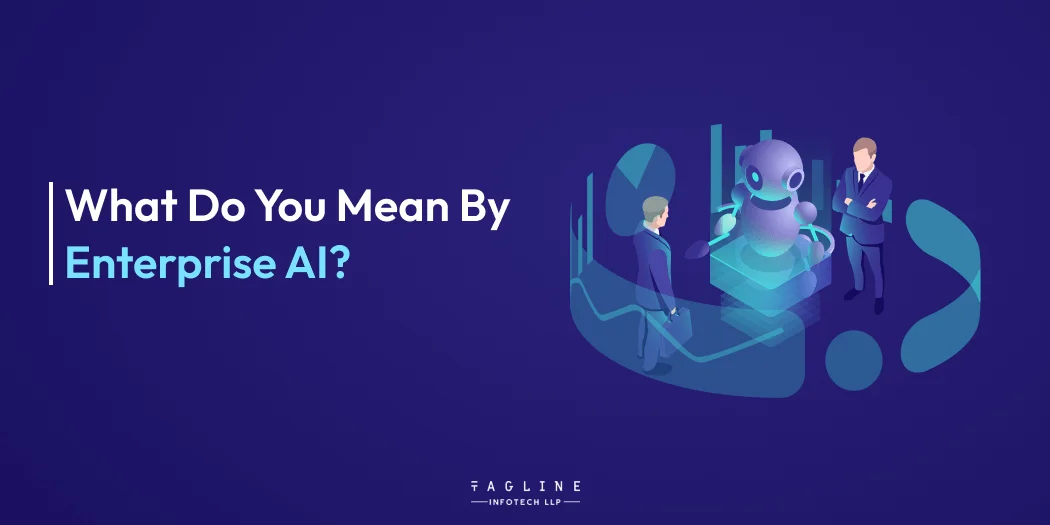
Quick Summary
Enterprise artificial intelligence means implementing artificial intelligence technology and methods into big businesses to enhance various functions. An endless range of tasks fall under this category, including data gathering and analysis, automation, customer service, risk management, and more. The use of artificial intelligence (AI) techniques, machine learning (ML), computer vision, natural language processing (NLP), and other tools to solve complex business challenges, automate processes, and get insights from massive volumes of data are all included in this.
It is possible to use enterprise AI in a variety of different domains. Supply chain management, finance, marketing, customer service, human resources, and cybersecurity are some aspects that fall under this category. The ability to make decisions based on data, improve efficiency, streamline workflows, enhance customer experiences, and gain a competitive advantage in the market are all made possible by this technology.
Here are some of the list characteristics of Enterprise AI:
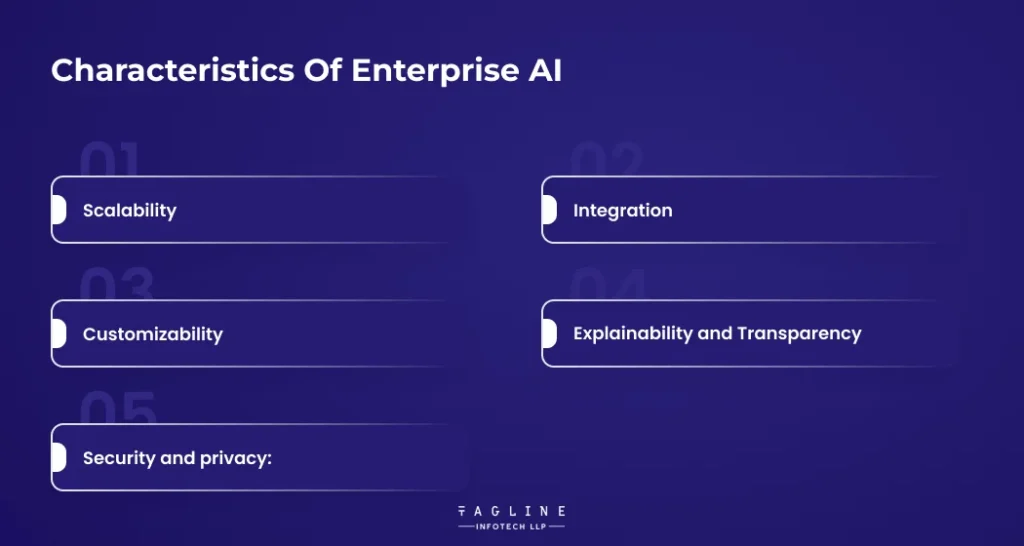
Artificial intelligence solutions for businesses should be scalable to meet the organization’s needs and handle massive volumes of data. They must be capable of processing and analyzing a broad range of data sources from various organizational systems.
An enterprise AI system should seamlessly integrate with the current IT infrastructure and business procedures. It should be able to access and analyze data from various sources, including databases, application programming interfaces (APIs), and enterprise resource planning (ERP) systems.
Artificial intelligence solutions should be tailored to each business’s unique needs, as different firms have different needs. This could entail tailoring techniques to solve problems unique to a particular region or training machine learning models on data pertinent to the company.
Businesses that use artificial intelligence systems ought to be able to justify their decisions and recommendations. It also ensures compliance with laws requiring explanations for automated systems’ decisions, which helps build stakeholder confidence.
Artificial intelligence systems must prioritize security and privacy in their design because businesses handle sensitive data. To protect the data assets of an industrial organization, stringent adherence to data protection regulations, strong data encryption, and access controls are needed.
“Top 5 Artificial Intelligence Applications in 2023 “
– Also Read Article
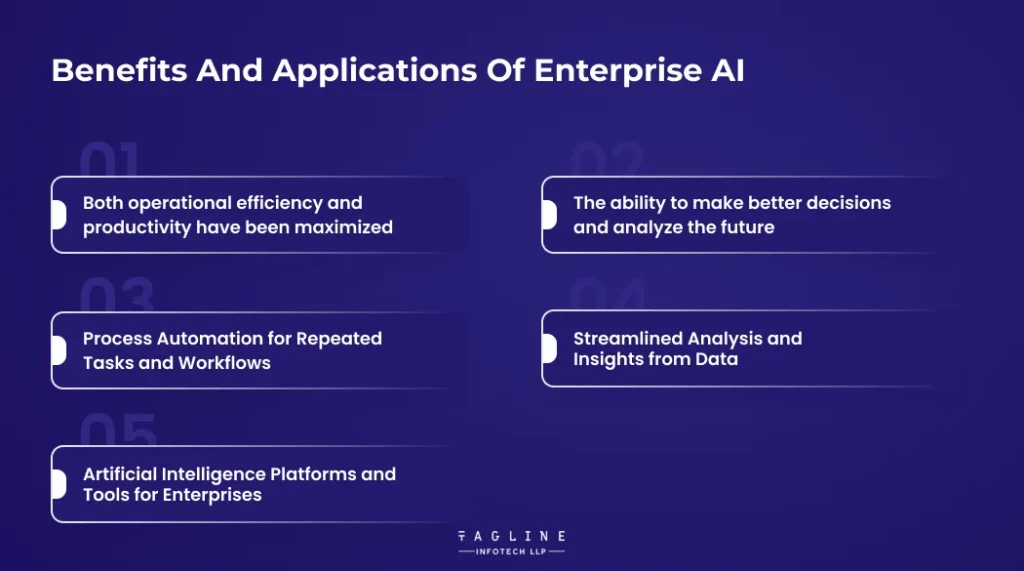
Here are some of the benefits of Enterprise AI
The ability of enterprise artificial intelligence to automate tedious and repetitive procedures is one of its most significant advantages. Employees can focus on tasks that are more high-value and strategic because this frees up some of their already-existing time.
It makes it possible to streamline processes, lower human error rates from manual work, and increase operational efficiency in various departments and roles, such as supply chain management and human resources. All in all, it is a miracle that saves productivity.
Enterprise artificial intelligence companies may make well-informed decisions based on thorough insights from quickly analyzing large datasets and forecasting patterns and risks. The procedure helps to find connections, patterns, and trends that might take time to be noticeable. This gives rise to the potential for more successful and accurate decisions.
One typical example is using artificial intelligence to learn from customers’ searches, purchases, and activities. Online shopping is one instance of this. This facilitates e-commerce companies’ ability to give customized search alternatives and offers to their customers, enhancing the user experience.
Whether it’s the excitement around Tesla’s autonomous cars or Amazon’s Alexa, several instances of artificial intelligence are used to promote faster and more convenient solutions for the general public.
The application of enterprise artificial intelligence allows businesses to reduce the time spent gathering and processing data. It saves time and streamlines procedures, allowing involved teams to focus on the tasks needed for interpersonal communication.
Artificial intelligence algorithms are well known for analyzing enormous amounts of data in real-time, spotting patterns and anomalies that indicate trends and possible dangers. With the currently available data, people need help evaluating trends and deriving valuable insights from in-depth analysis of how enterprise artificial intelligence organizations can.
Over time, it promotes decision-making, frees workers’ schedules to attend to other essential tasks, and helps enterprises obtain a competitive edge. This proves helpful for areas like the banking sector that are more vulnerable to potential threats.
Businesses may more easily access their resources and skills using enterprise artificial intelligence tools and platforms, which helps them maximize their AI potential. These tools typically include capabilities for data preparation, model training, and integration, which makes it incredibly simple for businesses to apply AI solutions and successfully foster innovation throughout their operations.
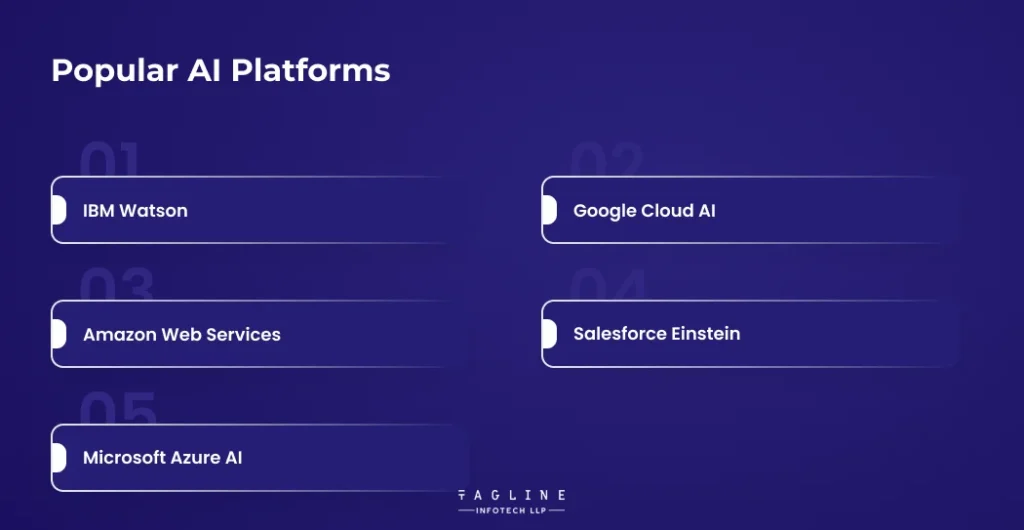
Here are some of the famous AI platforms:
The following are some of the most well-known enterprise artificial intelligence platforms and tools that may offer businesses complete solutions:
IBM Watson is a famous enterprise artificial intelligence platform that provides a broad range of AI services, including data analytics, computer vision, machine learning, and natural language processing. Another name for IBM Watson is IBM Watson.
These technologies enable the development of artificial intelligence models, system integration, and the implementation of AI-driven solutions across multiple sectors. These enterprise AI applications are crucial for businesses seeking to leverage AI for enhanced efficiency, decision-making, and innovation.
Google Cloud AI provides a range of artificial intelligence (AI) technologies and services for business applications. Its services include computer vision, speech recognition, natural language processing, and machine learning.
The platform consists of tools like Google Cloud AutoML, which enables the creation of custom models, and Google Cloud AI Platform, which facilitates model training and deployment.
It offers various artificial intelligence (AI) services and capabilities through its AWS AI platform. Included are services like Amazon Comprehend (used for natural language processing), Amazon Rekognition (used for computer vision), and Amazon SageMaker (used for building and training machine learning models). Amazon Web Services (AWS) AI provides pre-built AI models and tools to create custom AI applications.
Connected to the Salesforce customer relationship management system, Salesforce Einstein is an artificial intelligence platform related to customer relationship management and sales processes.
This AI platform offers a comprehensive range of artificial intelligence (AI) tools and services. This bundle includes Azure Bot Service, Azure Machine Learning, used to create chatbots, and Azure Cognitive Services, intended to interpret audio, vision, and language. The platform enables enterprises to design, develop, and oversee large-scale artificial intelligence systems.
Empower your enterprise with the limitless possibilities of Ai
Connect with our dedicated developer team to kickstart your intelligent journey
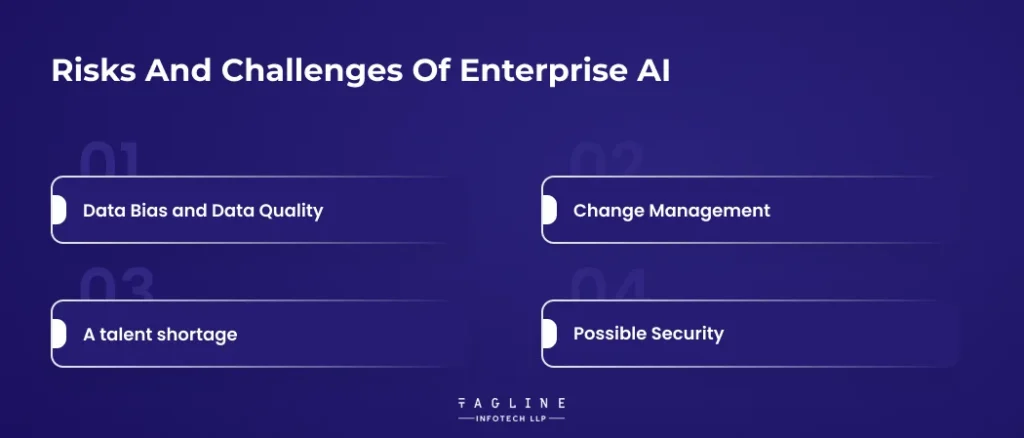
Furthermore, understanding the enterprise AI definition is essential, as implementing enterprise AI poses several challenges and issues, including the following:
Because artificial intelligence models rely heavily on data, erroneous or unfair outcomes can result from biased data or poor data quality. It is critical to ensure the accuracy of the data, eradicate any biases, and routinely monitor and validate the AI models.
The use of artificial intelligence may entail changes to the organization’s culture and organizational structure. Obstacles to successfully applying AI include:
The demand for artificial intelligence (AI) talent regularly outstrips supply, making it difficult for firms to find personnel with the requisite skills. One of the most pressing issues is recruiting and retaining talented data scientists and AI professionals.
Risks AI systems are vulnerable to threats, including adversarial attacks and data poisoning. Corporations must utilize comprehensive security measures including data encryption, access limits, and frequent vulnerability assessments.
In the upcoming years, enterprise artificial intelligence is expected to snowball. Here are a few significant advancements and patterns to note:
Enterprise AI meaning involves the integration of natural language processing, artificial intelligence, and data analytics to enhance business operations. Augmented analytics, a key aspect of enterprise AI, enables business users to easily access and understand complex data insights. This technology allows even those who may not be technologically adept to make data-based decisions and recognize meaningful patterns and trends.
Businesses can process and analyze data directly at edge devices or servers by combining edge computing with artificial intelligence capabilities. This facilitates better real-time decision-making and lowers latency in circumstances requiring prompt action.
As cyber threats evolve, AI can be a vital tool for spotting and averting security breaches. Network traffic may be examined, malicious behavior patterns can be found, and cybersecurity safeguards can be reinforced using artificial intelligence algorithms.
Humans and AI systems must collaborate more closely to utilize workplace AI fully. However, people will be in charge of providing context, subject-matter knowledge, and moral supervision. Artificial intelligence will provide insights, automate repetitive tasks, and help humans make decisions.
Business AI transforms how companies operate, make decisions, and interact with customers. Tagline Infotech is a leading company that uses various Enterprise AI platforms to deliver the best AI-based solution for you. Businesses that leverage artificial intelligence technologies can enhance operations, foster innovation, and obtain a competitive edge. On the other hand, implementing enterprise artificial intelligence needs careful planning, data management, hiring talent, and applying ethical considerations. To increase their chances of success in the future, organizations must embrace artificial intelligence (AI) as a strategic asset and stay up to date with emerging trends as AI develops.
An Enterprise AI platform can be simply described as a platform that is integrated with different types of technologies that can help different types of businesses to design and develop enterprise AI apps.
Developers prefer to use Enterprise AI platforms like IBM Watson, Amazon Web Services, and Microsoft Azure AI for AI development.

Digital Valley, 423, Apple Square, beside Lajamni Chowk, Mota Varachha, Surat, Gujarat 394101
D-401, titanium city center, 100 feet anand nagar road, Ahmedabad-380015
+91 9913 808 2851133 Sampley Ln Leander, Texas, 78641
52 Godalming Avenue, wallington, London - SM6 8NW